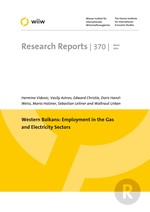Western Balkans: Employment in the Gas and Electricity Sectors
Vasily Astrov, Edward Christie, Doris Hanzl-Weiss, Mario Holzner, Sebastian Leitner, Waltraut Urban and Hermine Vidovic
wiiw Research Report No. 370, March 2011
150 pages including 24 Tables and 27 Figures
Summary German (PDF) Summary French (PDF)
The objective of this study is to analyse employment developments in the gas and electricity sectors in seven Western Balkan Contracting Parties of the Energy Community. These are Albania, Bosnia and Herzegovina, Croatia, the former Yugoslav Republic of Macedonia, Montenegro, Serbia and Kosovo under UNSCR 1244/99. In addition, the impact of the liberalization of the respective markets is examined (quantitatively and qualitatively) and the most likely trends for the future development are identified. In more detail, the study analyses the current state of the gas and electricity sectors in the Western Balkan countries as well as the evolution of employment in these sectors and the different areas of activities by structural features. Based on results from interviews with the main stakeholders of the energy sector, it assesses the impact of liberalization and EU energy legislation on the number of jobs in the Western Balkan countries. We also examine the process of job destruction and job creation during the period of liberalization and restructuring and explore how different categories of workers are affected. Specific emphasis is given to the impact on the quality of jobs, such as changing skill requirements, improvements in work organization and working conditions.
Keywords: Western Balkans, energy market liberalization, employment, job quality, restructuring
JEL classification: J21, J24, J28, J50, L94, L95, Q4
Countries covered: Albania, Bosnia and Herzegovina, Croatia, Kosovo, North Macedonia, Montenegro, Serbia
Research Areas: Labour, Migration and Income Distribution, Sectoral studies
